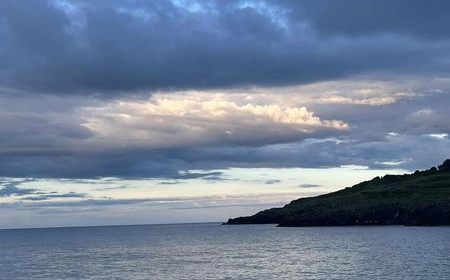The view from Glen Beach, Wicklow, Ireland
Co-published with the Centre for Brexit Studies:
From my new home, it is a 20-minute walk — up a sharp hill, past the cows and horses, and through the gate with the sign “No Unauthorized Persons” which no one heeds — to the 3 Lighthouses on Wicklow Head.
Folks say that on an exceptionally clear day over the Irish Sea, you can see the hills of Wales. But as I stand on the eastern-most point on the mainland of Ireland, however intensely I stare, however bright the sun shines, I cannot glimpse them.
Britain has disappeared.
A Door Closes
It is now almost three months since I took the car, our old, grumpy cat, and some of our belongings across the sea that I visit every day. As we left the ferry, as the vet said our Dougal had passed all checks and, no, I couldn’t leave him there, an emotional door shut.
Since I took another journey in September 1981, without a cat but with a typewriter and a lot of naïveté, from Atlanta to London, the UK had been at the center of my life. Every moment was an immersion into politics, sport, music, the peculiarities of expression and humour so different from those of my American South. Over more than 40 years, there would be friendships, careers, houses, marriages, and children. But I never stopped being a student, always curious about a land which for my parents was simply the Queen and Benny Hill.
Now those studies were over, replaced by the Wicklow hills, the coastal path, Phil’s pub, and a country which feels more like a large village. Folks here actually say hello, and mean it, when you pass on the pavement.
I no longer wake to the Today programme or its 21st-century descendant, the BBC app. The Guardian is still a fixture, but primarily for news from Ukraine to Gaza to the US. The General Election, which would have been an obsession only six months ago, is a distant, off-tune hum of Rishi’s D-Day walkout, Farage, and the latest dubious claim about taxes.
The music is still here. So is Doctor Who, even if it means staying in on Saturday night because of the BBC’s strict no to video recording. There might be a peek at the Three Lions this month in the Euros.
But all these feel likes treasured mementoes from a place once visited, rather than one ever-present.
And May Not Re-Open
I don’t think I am alone in this. Apart from TV and radio interviews, I have yet to meet anyone engaged with what is happening across the sea. Any vestige of “England” is history — Billy Byrne the Pikeman’s statue in Monument Square, commemorating the 1798 Rising; the exhibition of injustices in Wicklow Gaol; the late 17th-century facade of the Town Hall — rather than contemporary.
This isn’t from hostility. My very-English wife has received the warm, effusive welcome that I have enjoyed, even as a grandfather, with his family watching Ireland v. England in rugby, reminded me, “In 30 years, you’ll still be a blow-in.”
Instead, it is indifference. The primary concern across this country was ensuring that Brexit did not cut off North from South or, even worse, regenerate the violence of the late 20th century. Once the UK Government, shod of Boris Johnson and his manipulations, accepted the Northern Ireland Protocol and put away the threat of the “hard border”, normal life and business could be resumed. Indeed, more than resumed: because of Northern Ireland’s economic feet in the European Union, both the North and the Republic are reaping the benefits of Britain’s divorce from the Continent.
Now, when our new neighbours speak to us of Brexit, it is with a momentary bewilderment: how could a nation make such a mistake? No answer is ever attempted. Nor is there invective or anger, just a shrug of the shoulders as the door on Britain again closes.
Apparently the British economy is flatlining again, with a growth rate of 0.0% in April. Unemployment is at its highest rate since the pandemic. The Conservative Party is in disarray; Labour — too scared to even mumble “Single Market” — chunters that its “Change” is to “make Brexit work”; and few people appear to be paying attention to the Liberal Democrat pledge “to place the UK-EU relationship on a more formal and stable footing”.
Just up the coast in Dun Laoghaire, I listen to an Irish diplomat speak about his time in London and Brussels. The turmoil of the Brexit negotiations is gone, he says. Instead, if Britain is raised in the halls of the European Union, the general response is “Why are you bothering us with this?”
Farewell To All That
My wife and I are on the small beach at the western end of the cliff walk from the 3 Lighthouses. She watches the wind whip up whitecaps as the tide come in. I look to the horizon at the ferry cutting through waves on the way to Holyhead. I wonder for a moment who is en route, in the other direction from that of Dougal and me 11 weeks earlier, and what they might encounter.
But only for a moment. Dinner is waiting in the house. The final results of the European elections may have come in, only a week after the vote. The neighbors may be dropping by for wine and music. And maybe we’ll check in on the Fleadh tomorrow.
Britain has disappeared.

